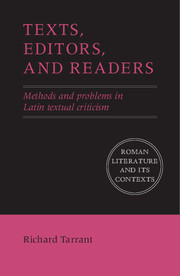Book contents
- Frontmatter
- Dedication
- Contents
- Preface
- Introduction
- 1 Textual criticism in a post-heroic age
- 2 The rhetoric of textual criticism/textual criticism as rhetoric
- 3 Establishing the text 1: recension
- 4 Establishing the text 2: conjecture
- 5 Establishing the text 3: interpolation, collaboration, and intertextuality
- 6 Textual criticism and literary criticism: the case of Propertius
- 7 Presenting the text: the critical edition and its discontents
- 8 The future: problems and prospects
- Appendix Reading a critical apparatus
- Bibliography
- General index
- Index of passages discussed
- Index of scholars
8 - The future: problems and prospects
Published online by Cambridge University Press: 05 March 2016
- Frontmatter
- Dedication
- Contents
- Preface
- Introduction
- 1 Textual criticism in a post-heroic age
- 2 The rhetoric of textual criticism/textual criticism as rhetoric
- 3 Establishing the text 1: recension
- 4 Establishing the text 2: conjecture
- 5 Establishing the text 3: interpolation, collaboration, and intertextuality
- 6 Textual criticism and literary criticism: the case of Propertius
- 7 Presenting the text: the critical edition and its discontents
- 8 The future: problems and prospects
- Appendix Reading a critical apparatus
- Bibliography
- General index
- Index of passages discussed
- Index of scholars
Summary
E. R. Dodds: ‘Our editions of Greek and Latin authors are good enough to live with’; D. R. Shackleton Bailey: ‘Maybe, maybe not; it all depends on one's standard of living’.
In this chapter, I will attempt a brief look forward into the future of editing classical texts. The questions I want to consider are these: What remains to be done in the area of textual criticism and editing? To what extent will traditional editing procedures be affected by new and emerging technology?
I
A natural starting point would be to ask which authors are and are not currently represented in satisfactory editions. ‘Satisfactory’ is a replacement for ‘definitive’, a concept that for reasons previously discussed I do not believe is applicable in this area. But that innocent-seeming question immediately raises another: what constitutes a satisfactory edition? The exchange between Dodds and Shackleton Bailey (even if only ben trovato) shows that eminent scholars can differ on that point. A minimal definition of a satisfactory edition might be one that accurately reports the essential manuscript evidence and reflects the current state of thinking about a text well enough to provide a basis for further study. Acceptable standards of living vary not only from person to person, but across time as well. Even an excellent edition will not remain satisfactory forever; for most authors, a good edition will have a useful lifespan of one or two generations, with fifty years an especially long life. (The obvious exceptions are editions of less-read texts, e.g., the Agrimensores, for which Lachmann's edition of 1848 was for more than 150 years the only critical edition of most of the corpus.)
There are certainly texts for which a new critical edition is not urgently needed. I think primarily of well-studied texts preserved in very few manuscripts or single manuscripts, such as Tacitus’ Annals 1–6 or the Roman history of Velleius Paterculus, or texts with manuscript traditions that lend themselves to stemmatic analysis, such as the biographies of Cornelius Nepos. Even here what is in question is not a ban, but a moratorium.
- Type
- Chapter
- Information
- Texts, Editors, and ReadersMethods and Problems in Latin Textual Criticism, pp. 145 - 156Publisher: Cambridge University PressPrint publication year: 2016



